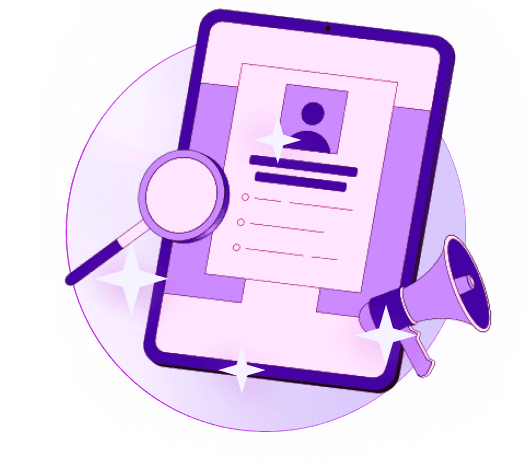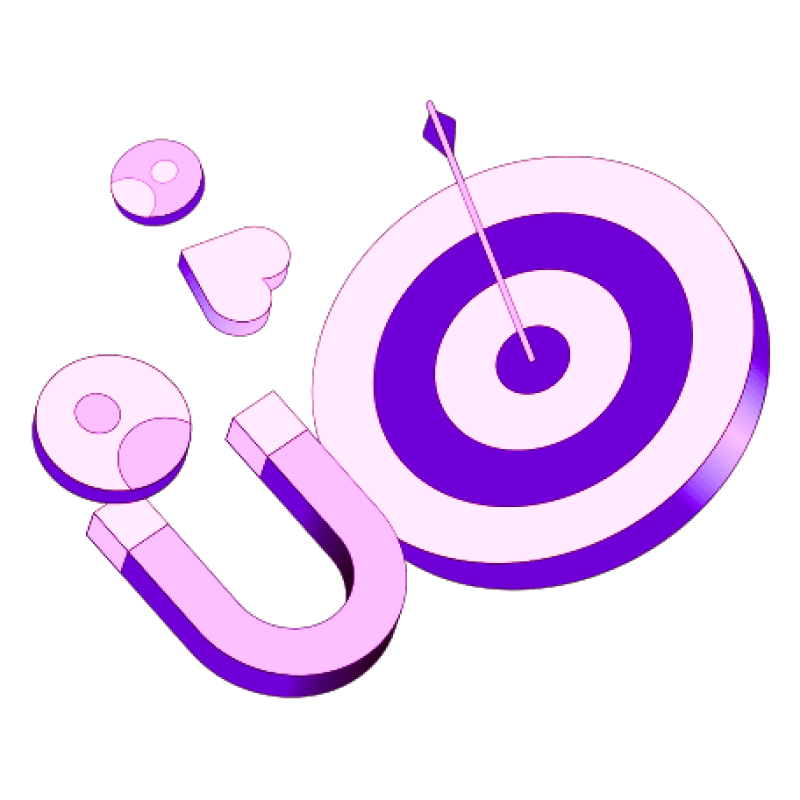Blogs
Articles

AI for Lead Qualification: Automate Scoring and Prioritize Prospects
AI-powered features can reduce lead servicing time by a whopping 31%. Pretty amazing, right? 🤔
Our proprietary study analyzed over 88,000 inbound leads and confirmed this time-saving benefit of AI for lead qualification. Sales teams face mounting pressure to respond quickly. Traditional manual qualification methods can't match today's competitive landscape.
Machine learning's lead scoring system stands out by assigning numerical values between 0 and 100 to each prospect. Higher scores indicate better conversion chances. Sales teams can focus their energy on promising opportunities and reduce wasted resources.
This piece will show you how AI alters lead qualification, available scoring models, and practical implementation steps for your sales process. Let's take a closer look!
What is AI Lead Qualification?
AI lead qualification is changing the way businesses spot their best potential customers. This technology uses machine learning algorithms to predict which leads will likely become customers. AI lead qualification ranks and assesses leads using complex patterns and more data points than traditional methods.
How it is different from traditional lead scoring
Traditional lead scoring uses fixed rules where points get manually assigned based on specific criteria like job title, company size, or customer actions. These systems look at just 5-10 attributes. This creates a fixed system that doesn't adapt well to new buyer behaviors.
Here's what makes AI-powered methods stand out:
Accuracy: Traditional methods are right only 15-25% of the time, while AI-powered qualification hits 40-60% accuracy
Adaptability: AI models learn continuously from past data and immediate behavior, but traditional scoring needs manual updates regularly
Complexity: Traditional systems use basic point systems like 5 points for job title and 10 for form submission. AI finds hidden connections between many factors
Data Analysis: AI processes hundreds of data points at once, which is a big deal as it means that traditional methods can't match this scope
Why automation is becoming essential
Quick lead response time is vital - companies see their lead qualification success drop 10x when they take more than five minutes to respond. Research shows that only 25% of marketing leads are good enough to go straight to sales.
Automation helps by cutting processing time by 30%. It removes human bias that causes inconsistencies. AI uses informed analysis to minimize errors and ensure accurate, objective evaluations.
The numbers tell an impressive story. Companies that utilize AI-powered scoring see an ROI of 138%, compared to 78% with traditional methods. Organizations using AI make 30% better decisions and grow revenue by 20%.
Experts say AI will power 80% of B2B sales interactions by 2025. Companies that don't embrace automation risk falling behind competitors who can qualify and respond to leads faster.
How AI Lead Scoring Works?
AI lead qualification works through a systematic process that turns raw data into practical sales insights. Here's how these intelligent systems work.
Data collection and enrichment
AI lead scoring starts by collecting information from multiple sources. The system pulls data from CRM systems, marketing automation platforms, website analytics, social media, chatbots, and third-party intent data. These digital channels give AI a detailed picture of each lead's behavior, demographics, and engagement history.
Raw data by itself won't cut it. This brings us to "feature engineering" – a process that turns collected information into meaningful indicators. A lead's email opens transform into metrics like "email engagement rate". This significant step will give a data interpretation that matches sales goals and buyer experiences.
Lead scoring using machine learning
Machine learning algorithms analyze historical information to spot patterns that relate to successful conversions after data preparation. The model looks at which leads converted before, their conversion time, and behaviors they expressed.
The algorithms weigh different lead characteristics based on how they contribute to conversion likelihood. Leads then get scores (typically between 0-100) that indicates their conversion probability. Higher scores show better-qualified leads, which helps sales teams set outreach priorities.
Real-time scoring and routing
The system scores new incoming leads automatically by comparing them to past successful conversions. This live process lets sales teams connect with potential customers right when their interest peaks. To cite an instance, a prospect asking for a demo would get an immediate score boost in the CRM before anyone sees that message.
Sales teams can fast-track high-scoring leads while lower-scoring ones enter nurturing workflows. This smart routing gives each prospect the right attention based on their qualification level.
Continuous learning and model updates
The most powerful feature of AI lead scoring lies in its adaptability as market conditions change. Algorithms adjust scoring criteria live as new data comes in. This keeps everything in sync with current trends. The system becomes more accurate through regular retraining with fresh information.
The best results come from monthly feedback loops. Retrain your model with the latest engagement data and closed deal outcomes. You can try our AI-powered qualification platform at Persana to see how continuous learning optimizes lead prioritization.
Benefits and Challenges of AI Lead Qualification
Companies that use AI for lead qualification see amazing improvements in their sales processes. Let's get into both sides of this technology.
Faster speed-to-lead and better prioritization
Companies achieve a 75% chance of converting leads into customers if they respond within five minutes. The success rates drop by 400% with just a 10-minute delay. AI solves this by cutting lead processing time from 20 minutes to just 20 seconds. Sales teams can then focus on the most promising prospects first.
Sales and marketing teams work better together
AI lead scoring ends the old conflicts between sales and marketing teams. Both teams now work with a single, data-driven qualification system. This move creates a "mutual definition of value" based on machine logic instead of team opinions. Teams no longer argue about lead quality or the right time to reach out.
Common challenges and how to overcome them
AI lead qualification brings great benefits, but companies face some key hurdles:
Data quality issues: Poor or incomplete data can ruin even the best AI models
System integration: Adding AI to existing CRM systems can be technically difficult
Human resistance: Sales teams might not trust AI suggestions without proper training
Regular data cleansing, AI platforms with ready-made integrations, and detailed training help solve these problems. The technology becomes clear and useful. See how AI lead qualification can reshape your sales process - sign up at Persana.
Types of AI Lead Scoring Models
Lead scoring models come in many shapes and forms. Each model assesses prospects differently, and choosing the right one can make your qualification process much better.
ICP-based scoring
The ICP-based model looks at how well leads match your ideal customer profile. It analyzes company data like size, revenue, and industry, among demographic details such as job titles and decision-making power. Companies that use ICP scoring see better quality pipelines because they target prospects who fit their success patterns.
Engagement-based scoring
This approach tracks how leads connect with your content and messages. The model looks at website visits, email opens, downloads, and social media activity to assign values based on importance. Visits to pricing pages carry more weight than blog post views since they show stronger buying intent.
Intent-based scoring
Intent scoring zeros in on actions that suggest purchase readiness. The model prioritizes demo requests, pricing page visits, and product content engagement. Companies using intent-based scoring have seen their sales efficiency jump by 40%.
Negative scoring models
Negative scoring spots unqualified leads by taking away points for actions that show low conversion potential. This helps filter out competitors who watch your content, job hunters, and spam. Your team can then focus on real prospects.
Conversational AI lead scoring
This new model rates leads based on chatbot interactions and sales calls. It analyzes questions, tone, and engagement during conversations to gage purchase readiness. You can see how conversational AI changes lead qualification at Persana.
Conclusion
AI for lead qualification helps sales teams who struggle with old manual methods. The proof is clear - faster responses, better accuracy, and improved coordination between sales and marketing teams make AI-powered qualification tools worth a look.
Moving from old scoring to AI methods brings real benefits. Teams see huge jumps in prediction accuracy, from 15-25% with traditional methods to 40-60% with AI solutions. The ROI numbers tell a similar story - AI-powered scoring delivers 138% returns compared to 78% from traditional approaches.
AI lead qualification comes with its share of hurdles. Poor data quality, complex system integration, and team resistance can slow things down. Regular data cleanup, platforms with ready-made integrations, and thorough team training are the keys to making it work.
Different scoring models serve unique purposes in qualification strategy. ICP-based, engagement-focused, intent-driven, and conversational AI each play their part. The right mix can reshape how teams spot and connect with promising prospects.
Companies using AI for lead qualification stay ahead through quick responses, qualified pipelines, and streamlined sales. Others who wait risk falling behind as projected 80% adoption rate of AI in B2B sales interactions by 2025 gets closer.
Lead qualification directly affects your profits. AI works alongside human judgment and boosts it with analytical insights. Sales teams can now put their energy where it counts - closing deals with interested prospects instead of chasing dead ends.

Create Your Free Persana Account Today
Join 5000+ GTM leaders who are using Persana for their outbound needs.
How Persana increases your sales results
One of the most effective ways to ensure sales cycle consistency is by using AI-driven automation. A solution like Persana, and its AI SDR - Nia, helps you streamline significant parts of your sales process, including prospecting, outreach personalization, and follow-up.



